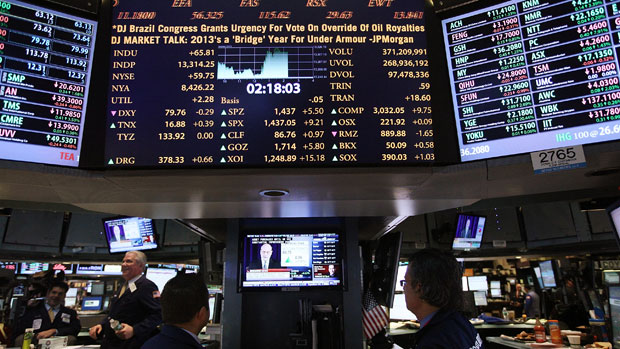The best investments of 2014 – and the worst
The FTSE 100 had a solid rather than a stellar year, but those who put their money in US investments had better luck

A free daily email with the biggest news stories of the day – and the best features from TheWeek.com
You are now subscribed
Your newsletter sign-up was successful
How was 2014 for your portfolio? Had you majored on FTSE 100 stocks, said Merryn Somerset Webb on MoneyWeek.com, you'd have been in for another disappointment. Despite widespread predictions that the index would break through the all-time high of 6,930 set 11 years ago, it has failed to do so. In the week before Christmas, the market was approaching 6,500, requiring "an impressive Santa rally to enter 2015 better off than we left 1999".
In the UK last year, it was all about stock-picking, said Laith Khalaf of Hargreaves Lansdown. And at least one big name delivered. Britain's best-performing equity income fund was star manager Neil Woodford's eponymous new fund, which "got off to a flying start", returning 7.4 per cent since June, compared with just 0.7 per cent from the average UK equity income fund.
The main gains on Western stock markets were again to be found in the US. Tumbling energy prices, narrowing deficits, low inflation and "lower-for-longer interest rates" have made the US a "lucky country", said Tom Stevenson in The Sunday Telegraph. The "string of new highs" – which saw the S&P 500 gain around 14 per cent – was "a logical response to that". That said, it was "a biblically bad year for almost anyone attempting to beat the main stock indices", said John Authers in the FT. US active managers "were whipped by their benchmarks". The big winners were the low-cost tracker funds, notably Vanguard.
The Week
Escape your echo chamber. Get the facts behind the news, plus analysis from multiple perspectives.

Sign up for The Week's Free Newsletters
From our morning news briefing to a weekly Good News Newsletter, get the best of The Week delivered directly to your inbox.
From our morning news briefing to a weekly Good News Newsletter, get the best of The Week delivered directly to your inbox.
Of the other main foreign indices, investors who kept faith with the Japanese PM, Shinzo Abe, did well: the Nikkei gained more than 11 per cent, despite Japan's return to recession. But the outstanding returns this year were in India, where the Sensex was swept up in "Modi mania" by the new PM Narendra Modi's promise of reforms, said Tanya Jefferies on ThisisMoney.co.uk. India swept the top three slots of the top ten best-performing funds last year, with First State Indian Subcontinent, Neptune India and Jupiter India all delivering returns above 50 per cent.
It comes as no big surprise that the year's worst investments were to be found in commodities and the countries producing them, said MSN.com. The worst performer was crude oil (Brent crude is down more than 44 per cent); and the worst-performing currency was the rouble, which suffered a similar decline against the dollar. Russian-focused funds, meanwhile, really "struggled" – as did shares in oil companies, and energy-related corporate bonds.
The individual who lost the most cash, according to Wealth-X, was Russian tycoon Leonid Mikhelson, the biggest shareholder in natural gas producer Novatek. He's reckoned to have lost $7bn, or 41 per cent of his wealth, in 2014. Despite all of this oil-related "ugliness", said Matt Phillips on Quartz, arguably the award for the most "atrociously awful" investment of 2014 goes to bitcoin. The value of the "heavily hyped crypto-currency" slumped by around 52 per cent.
A free daily email with the biggest news stories of the day – and the best features from TheWeek.com
-
 Antonia Romeo and Whitehall’s women problem
Antonia Romeo and Whitehall’s women problemThe Explainer Before her appointment as cabinet secretary, commentators said hostile briefings and vetting concerns were evidence of ‘sexist, misogynistic culture’ in No. 10
-
 Local elections 2026: where are they and who is expected to win?
Local elections 2026: where are they and who is expected to win?The Explainer Labour is braced for heavy losses and U-turn on postponing some council elections hasn’t helped the party’s prospects
-
 6 of the world’s most accessible destinations
6 of the world’s most accessible destinationsThe Week Recommends Experience all of Berlin, Singapore and Sydney
-
 What to expect financially before getting a pet
What to expect financially before getting a petthe explainer Be responsible for both your furry friend and your wallet
-
 What are the best investments for beginners?
What are the best investments for beginners?The Explainer Stocks and ETFs and bonds, oh my
-
 What to know before filing your own taxes for the first time
What to know before filing your own taxes for the first timethe explainer Tackle this financial milestone with confidence
-
 What’s a good credit card APR?
What’s a good credit card APR?The Explainer They have gotten even steeper in recent years
-
 How to juggle saving and paying off debt
How to juggle saving and paying off debtthe explainer Putting money aside while also considering what you owe to others can be a tricky balancing act
-
 Filing statuses: What they are and how to choose one for your taxes
Filing statuses: What they are and how to choose one for your taxesThe Explainer Your status will determine how much you pay, plus the tax credits and deductions you can claim
-
 The pros and cons of tapping your 401(k) for a down payment
The pros and cons of tapping your 401(k) for a down paymentpros and cons Does it make good financial sense to raid your retirement for a home purchase?
-
 3 tips to help protect older family members from financial scams
3 tips to help protect older family members from financial scamsthe explainer Prevent your aging relatives from losing their hard-earned money